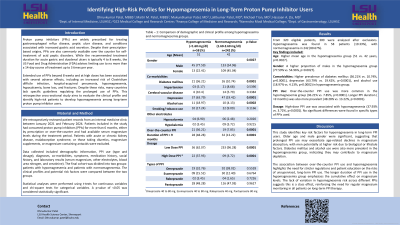Tuesday Poster Session
Category: Stomach
P5041 - Identifying High-Risk Profiles for Hypomagnesemia in Long-Term Proton Pump Inhibitor Users
Tuesday, October 29, 2024
10:30 AM - 4:00 PM ET
Location: Exhibit Hall E

Has Audio
- MP
Maitri Patel, MBBS
GCS Medical College and Research Centre
Ahmedabad, Gujarat, India
Presenting Author(s)
Dhruvkumar Patel, MBBS1, Maitri M. Patel, MBBS2, Mukundkumar Patel, MD3, Lalitkumar Patel, MD4, Michael Tran, MD5, Hassaan A. Zia, MD5
1LSU Health Science Center, Shreveport, LA; 2GCS Medical College and Research Centre, Ahmedabad, Gujarat, India; 3Ananya College of Medicine and Research, Ahmedabad, Gujarat, India; 4Narendra Modi Medical College, Ahmedabad, Gujarat, India; 5LSU Health, Shreveport, LA
Introduction: Proton pump inhibitors (PPIs) are commonly prescribed for gastroesophageal reflux disease, peptic ulcer disease, and other conditions involving excessive gastric acid secretion. Despite FDA guidelines, long-term use is common, raising risks for adverse effects, including hypomagnesemia, which can lead to serious neurological and cardiovascular issues. Identifying high-risk patients is critical for prevention and management.
Methods: This retrospective cross-sectional study analyzed records from patients presented to the internal medicine clinic between January 2021 and February 2024 who used PPIs for over six months. Exclusion criteria included acute/chronic kidney disease, malabsorption syndrome, and diuretic or magnesium supplement use. The study focused on demographic data, PPI use, comorbidities, medication history, and serum magnesium levels. Statistical analyses compared patients with hypomagnesemia (serum magnesium < 1.6 mg/dL) and normomagnesemia (serum magnesium 1.6-2.6 mg/dL), with significance set at p< 0.05.
Results: From 320 eligible patients, 300 were analyzed after exclusions. Hypomagnesemia was found in 58 patients (19.33%), with normomagnesemia in 242 (80.67%). Key findings included:
Discussion: This study highlights older age, male gender, diabetes, and alcohol use as significant risk factors for hypomagnesemia in long-term PPI users. The association with over-the-counter PPI use underscores the need for better regulation and patient education. The cumulative effect of prolonged PPI use on magnesium levels, irrespective of PPI type, indicates a class effect. Regular monitoring of magnesium levels in high-risk patients is recommended. Further research is needed to develop strategies to mitigate these risks and improve patient outcomes.
Note: The table for this abstract can be viewed in the ePoster Gallery section of the ACG 2024 ePoster Site or in The American Journal of Gastroenterology's abstract supplement issue, both of which will be available starting October 27, 2024.
Disclosures:
Dhruvkumar Patel, MBBS1, Maitri M. Patel, MBBS2, Mukundkumar Patel, MD3, Lalitkumar Patel, MD4, Michael Tran, MD5, Hassaan A. Zia, MD5. P5041 - Identifying High-Risk Profiles for Hypomagnesemia in Long-Term Proton Pump Inhibitor Users, ACG 2024 Annual Scientific Meeting Abstracts. Philadelphia, PA: American College of Gastroenterology.
1LSU Health Science Center, Shreveport, LA; 2GCS Medical College and Research Centre, Ahmedabad, Gujarat, India; 3Ananya College of Medicine and Research, Ahmedabad, Gujarat, India; 4Narendra Modi Medical College, Ahmedabad, Gujarat, India; 5LSU Health, Shreveport, LA
Introduction: Proton pump inhibitors (PPIs) are commonly prescribed for gastroesophageal reflux disease, peptic ulcer disease, and other conditions involving excessive gastric acid secretion. Despite FDA guidelines, long-term use is common, raising risks for adverse effects, including hypomagnesemia, which can lead to serious neurological and cardiovascular issues. Identifying high-risk patients is critical for prevention and management.
Methods: This retrospective cross-sectional study analyzed records from patients presented to the internal medicine clinic between January 2021 and February 2024 who used PPIs for over six months. Exclusion criteria included acute/chronic kidney disease, malabsorption syndrome, and diuretic or magnesium supplement use. The study focused on demographic data, PPI use, comorbidities, medication history, and serum magnesium levels. Statistical analyses compared patients with hypomagnesemia (serum magnesium < 1.6 mg/dL) and normomagnesemia (serum magnesium 1.6-2.6 mg/dL), with significance set at p< 0.05.
Results: From 320 eligible patients, 300 were analyzed after exclusions. Hypomagnesemia was found in 58 patients (19.33%), with normomagnesemia in 242 (80.67%). Key findings included:
- Age: Higher mean age in the hypomagnesemia group (51 vs. 42 years, p=0.0027).
- Gender: A higher proportion of males in the hypomagnesemia group (77.59% vs. 54.96%, p=0.0027).
- Comorbidities: Higher prevalence of diabetes mellitus (36.21% vs. 10.74%, p=0.0001), depression (63.79% vs. 19.42%, p=0.0001), and alcohol use (18.97% vs. 4.13%, p=0.0002) in hypomagnesemia group.
- PPI Use: Over-the-counter PPI use was more common in the hypomagnesemia group (36.21% vs. 7.85%, p=0.0001). Longer PPI duration ( >9 months) was also more prevalent (48.28% vs. 13.22%, p=0.0001).
- Dosage: High-dose PPI use was associated with hypomagnesemia (37.93% vs. 3.72%, p=0.0001). No significant differences were found in specific types of PPIs used.
Discussion: This study highlights older age, male gender, diabetes, and alcohol use as significant risk factors for hypomagnesemia in long-term PPI users. The association with over-the-counter PPI use underscores the need for better regulation and patient education. The cumulative effect of prolonged PPI use on magnesium levels, irrespective of PPI type, indicates a class effect. Regular monitoring of magnesium levels in high-risk patients is recommended. Further research is needed to develop strategies to mitigate these risks and improve patient outcomes.
Note: The table for this abstract can be viewed in the ePoster Gallery section of the ACG 2024 ePoster Site or in The American Journal of Gastroenterology's abstract supplement issue, both of which will be available starting October 27, 2024.
Disclosures:
Dhruvkumar Patel indicated no relevant financial relationships.
Maitri Patel indicated no relevant financial relationships.
Mukundkumar Patel indicated no relevant financial relationships.
Lalitkumar Patel indicated no relevant financial relationships.
Michael Tran indicated no relevant financial relationships.
Hassaan A. Zia indicated no relevant financial relationships.
Dhruvkumar Patel, MBBS1, Maitri M. Patel, MBBS2, Mukundkumar Patel, MD3, Lalitkumar Patel, MD4, Michael Tran, MD5, Hassaan A. Zia, MD5. P5041 - Identifying High-Risk Profiles for Hypomagnesemia in Long-Term Proton Pump Inhibitor Users, ACG 2024 Annual Scientific Meeting Abstracts. Philadelphia, PA: American College of Gastroenterology.

